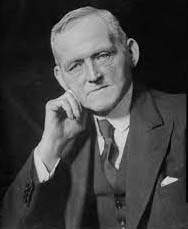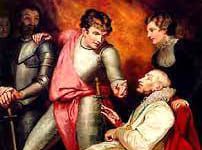N McKinnel | The Bishops Candlesticks | An Analytical Study
N McKinnel | The Bishops Candlesticks | An Analytical Study
N McKinnel | The Bishops Candlesticks | An Analytical Study
Norman McKinnel (1870-1932) was a Scottish actor and playwright. He earned fame as a popular actor of his day. Through his plays, he tried to show the ugliness of society and thus he wished to exhibit the holes and pinches of society. The present play ‘The Bishops Candlesticks’ is a one-act play. It is not his original work, but an adaptation of the story of the first few chapters of Victor Hugo’s celebrated novel ‘Les Miserables’. The play gives a vivid picture of the social scene of France in the last century. During that century how the people of France, especially the proletariat had lived a suffered life—is typically portrayed in the play. Cruelty and mercy is the main theme of the play. The main character of the play is a convict who, being poor and helpless, had stolen a piece of bread was caught by the police and was sent to jail for ten years. Later on, he escaped from jail and came to a Bishop’s home where he was shown pity and favour, but the convict stole the valuable candlesticks of the Bishop and ran away. The police caught him and brought him back to the Bishop. But the Bishop forgave him giving him the candlesticks as a gift and turning him into a good man. Thus the playwright shows how poverty breeds crime and in turn how pity, love and sympathy can convert a miscreant into a good man.
The main attraction of the play goes not to the convict but to the Bishop. He is a philanthropist and kind to everybody and he treats well with the thief. The Bishop loves everybody as a Christ and hence he gives away his belongings to those who seem more needy. He says to his sister Persome while she forbids her brother, the Bishop to give away the candlesticks to the convict:
…….The candlesticks were mine, they are his now. It is better so. He has more need of them than I.
The second important character is the Convict. But he draws less sympathy because his dealing with the Bishop is too much harsh and inhuman. The readers’ sympathy goes to him only then—when he says that he stole for being too poor not willingly and the officials of the jail had turned him into a thief.
The third character Persome is the widowed sister of the Bishop, who typifies women in general. He loves his brother the Bishop and takes care of him as a sister.
The fourth character ‘Marie’ is a maidservant at the Bishop’s home. He is stupid and is always afraid of Persome and acts upon what Persome orders and compels her to do.
As the main aim of the playwright is to portray the kindness, benevolence, and Merci of the Bishop so the arts and plot of the play suffer from weakness. It has no complications. The climax is also feeble. It has only a denouement and conclusion.
The Dialogues especially of the Bishop and the convict are more meaningful and often poetic which draws our attention. The soliloquies made by the convict just before he steals and runs away with the candlesticks are emotional, psychological and somewhat poetic.
In conclusion, it is well to say that the play ‘The Bishops Candlesticks’ is a humanitarian one-act play with less artistic success. 0 0 0
N McKinnel | The Bishops Candlesticks | An Analytical Study
Read More: Renaissance Elements in Doctor Faustus
N McKinnel | The Bishops Candlesticks | An Analytical Study
N. B. This article entitled ‘N McKinnel | The Bishops Candlesticks | An Analytical Study’ originally belongs to the book ‘World Drama Criticism‘ by Menonim Menonimus. N McKinnel | The Bishops Candlesticks | An Analytical Study
Related Searches:
- The Bishop’s Candlesticks-Analysis
- The Bishop’s Candlesticks by Norman Mckinnel
- Summary of The Bishop’s Candlesticks
- Doctor Faustus as an Allegory
- Renaissance Elements in Doctor Faustus
Books of Literary Criticism by M. Menonimus:
- World Short Story Criticism
- World Poetry Criticism
- World Drama Criticism
- World Novel Criticism
- World Essay Criticism
- Indian English Poetry Criticism
- Indian English Poets and Poetry Chief Features
- Emily Dickinson’s Poetry-A Thematic Study
- Walt Whitman’s Poetry-A Thematic Study
- Critical Essays on English Poetry
- Tawfiq al-Hakim’s Novel: Return of the Spirit-An Analytical Study
- Tawfiq al-Hakim’s Novel: ‘Yawmiyyat Naib Fil Arayaf’-An Analytical Study
- Analytical Studies of Some Arabic Short Stories
- A Brief History of Arabic Literature: Pre-Islamic Period …











